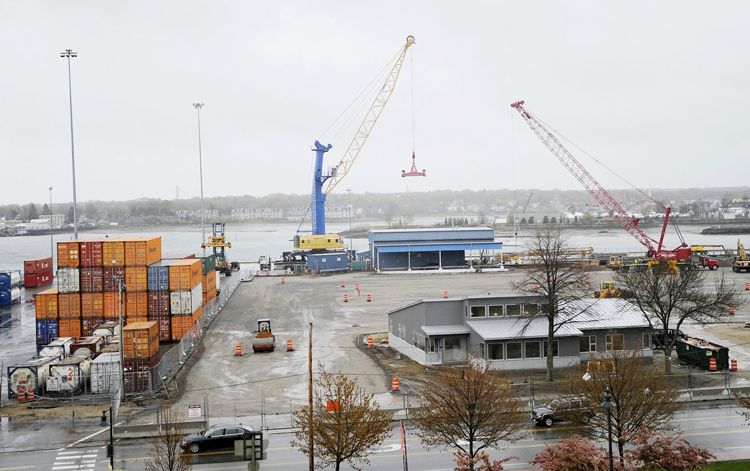PORTLAND — The port of Portland has lost scheduled container shipping again, nine months after the start of weekly service connecting Boston and Halifax, Nova Scotia.
New York-based American Feeder Lines announced late last week that it suspended operations, citing a lack of volume and loss of private investment. It now is announcing that the company is closing.
“We’re very disappointed, we thought the timing was right,” Rudy Mack, the company’s chief operating officer, told The Portland Press Herald.
The move is a blow to Portland, which is in the midst of rebuilding and expanding cargo facilities at the International Marine Terminal. The $5 million, federally funded project will be done this summer.
American Feeder Line’s demise also represents a financial loss for the Maine Port Authority. In early March, the authority approved a $200,000 loan to the company to help pay for operations.The money came from lease and dockage revenues, not tax dollars. Boston and Halifax made similar loans.
That investment now appears to be gone.
It’s possible that another operator will step in to resume the service from Halifax, an important market connection to New England. The port of Portland is being used by several Maine shippers. White Rock Distilleries in Lewiston, L.L. Bean in Freeport, Schnitzer Steel Industries in Auburn and a half-dozen paper mills, including Sappi’s Westbrook and Somerset facilities, have been either importing or exporting goods overseas through Portland and Halifax.
“There’s a lot of interest,” said John Henshaw, executive director of the Maine Port Authority. “This is a lost opportunity, but it’s not the last opportunity.”
The port of Portland has long had a strong commercial link to Halifax, which is home to several major shipping lines. But the port lost weekly container service to Halifax in 2008, when another company pulled out. A barge that took pulp to New York stopped calling in 2009.
The arrival of American Feeder Lines was a hopeful sign that Portland could again have stable and reliable freight service for business and industry. It also supported up to 20 longshoreman positions, for unloading cargo and operating the marine terminal.
Boston, Portland and Halifax were the first leg of a new venture meant to link a string of Altantic ports, from Miami to Portland.
American Feeder Lines had set up a hub-and-spoke network, in which imported cargo from large container vessels was shuttled to smaller ports, such as Portland, on a fleet of feeder ships. For exports, the smaller ships fed the big vessels. This so-called short-sea container service is a common way to move freight in other countries, but not in the United States, where it faces strong competition from trucks and railroads.
American Feeder Lines had hoped it could buck that trend. It ultimately wanted to build a fleet of environmentally friendly container ships that would take freight traffic off crowded, East Coast highways.
The company began operations last summer with a chartered vessel, the AFL New England. Mack said today that he and his partners put roughly $3 million into the venture, and received $2 million from investors. But the service wasn’t generating enough cash flow to continue, according to Mack. It also was hurt by diesel prices that soared this year to record levels.
“Volume grew every month, but at a very slow pace,” he said.
Henshaw noted that the service was starting from scratch again in Portland and it took time to sign up shippers.
“To my mind, it took longer than investors thought it would, but it was moving in the right direction,” he said.
Maine shippers were still waiting today to get official word about the future of the service. Harold Jones, traffic manager for White Rock Distilleries, has been importing tanks of grain alcohol from France through Halifax to Portland. It was more convenient and less costly to truck the alcohol from Portland than Boston, where it had been shipped prior to the new service.
“We’re very sorry to see the service suspended and hope it can resume,” he said.
“I’m not giving up on the port.”
If another operator doesn’t come forward, Jones said he’ll go back to Boston.
As of today, the AFL New England was anchored in Halifax Harbor, as lawyers and creditors decide the future of the ship and its cargo. It’s unclear whether it could be leased to another operator.
The province of Nova Scotia has expressed strong interest in seeing the service continue. A few weeks ago, it approved a $500,000 loan guarantee for American Feeder Lines, aimed at attracting more New England-bound container business for the port of Halifax. That loan was never completed, according to Canadian media reports.
The $200,000 loan by the Maine Port Authority was made in conjunction with Boston and Halifax, in an attempt to maintain the fledgling service in anticipation of more shippers.
“We obviously were concerned about the slowness of the service growing,” Henshaw said.
Henshaw said he plans to work with interested parties to try to save container service via Halifax. He’ll also explore the possible resumption of shipping to New York Harbor, with a federal maritime official who will be visiting Maine this week. The Marine Highway Program, as it’s called, aims to reduce air pollution and truck traffic by moving freight off highways and onto coastal corridors.
Send questions/comments to the editors.




Success. Please wait for the page to reload. If the page does not reload within 5 seconds, please refresh the page.
Enter your email and password to access comments.
Hi, to comment on stories you must . This profile is in addition to your subscription and website login.
Already have a commenting profile? .
Invalid username/password.
Please check your email to confirm and complete your registration.
Only subscribers are eligible to post comments. Please subscribe or login first for digital access. Here’s why.
Use the form below to reset your password. When you've submitted your account email, we will send an email with a reset code.